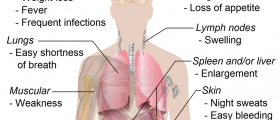
Formation of Lymph FluidBlood carries to the cells important substances such as oxygen, proteins, glucose and white blood cells and collects harmful materials for disposal. For the waste substances to be collected, exchange of respective constituents between blood and cells is required. This is provided due to interstitial fluid present between the cells. Since there is a constant exchange of material between the cells and interstitial fluid, composition of the fluid differs from tissue to tissue. Interstitial fluid forms at the arterial end of the capillaries. Since there is higher pressure of blood, most of the fluid returns to the venous ends while the remaining end up in the lymph capillaries as lymph. Thus, lymph is formed as watery clear fluid with the same composition as the interstitial fluid.
Composition of Lymph FluidThe lymph fluid contains white blood cells (lymphocytes). Composition of the lymph fluid is similar to composition of blood plasma but slightly differs depending on the specific tissue it is draining. For instance, when the lymph fluid comes out of a lymph node it is richer in white blood cells.
Circulation of Lymph FluidThe conducting system made of tubular vessels is responsible for carrying the lymph fluid back to the blood stream. This way, lost volume of blood during formation of interstitial fluid is replaced. The channels that transport the lymph fluid are called lymphatic channels or lymphatics. Unlike the cardiovascular system, the lymphatic system does not have central pump so the lymph circulates slowly and irregularly. The lymph travels along lymphatic channels due to contraction and relaxation of the smooth muscle, valves and adjacent arterial pulsation.
Disorders of Lymph FluidNumber of lymphatic system disorders, which typically affect the lymph nodes, can interrupt circulation of the lymph fluid and its composition. One of such disorders is lymphedema. It is a condition that occurs due to accumulation of the lymph fluid in the interstitial tissue. This leads to edema and swelling. Lymphedema can be caused by cancer, infection such as filariasis or due to surgical removal of the lymph nodes. Lymphadenopathy is a lymphatic system disorder characterized by swollen or enlarged lymph nodes. The condition is caused by an infection. Lymphadenitis represents inflammation of the lymph nodes due to a bacterial infection. Finally, lymphoma is a cancer that begins in the lymph nodes due to abnormal growth of white blood cells.
















Your thoughts on this
Loading...